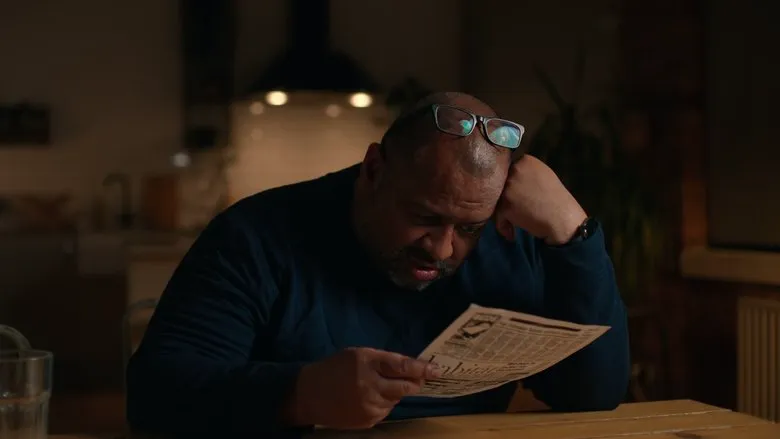Twisting the Truth: A Look at the Remake of “The Invisible Guest”
Note: This article contains spoilers.
The suspense film “No More Bets,” starring Greg Hsu and Janine Chang, might lead some viewers to believe it’s a production overseen by Chen Sicheng. This is because it bears the hallmarks of the “Chen Sicheng formula” that he has established through films like “Sheep Without a Shepherd,” “Fireflies in the Sun,” and “Lost in the Stars”: acquiring a successful suspense script, setting the story in Southeast Asia to circumvent censorship and expand the scope of content, and using a particular social sentiment as the core of the story to lay the foundation for viral dissemination.

Poster of “No More Bets”
Chen Sicheng leverages this formula to ensure a relatively high production rate and achieve excellent market returns for his films. The suspense films mentioned above have all grossed over 1 billion RMB (although their marketing costs are also high), with “Lost in the Stars” becoming a massive hit during the 2023 summer season, exceeding 3.5 billion RMB at the box office.
One slight difference is that Chen Sicheng is better at “disguise.” The suspense scripts he chooses are mature, but not widely known on the Chinese internet, meaning few viewers have seen the original versions. For example, both the Soviet and American versions of “Lost in the Stars” are very niche, which helps to preserve the suspense of the film and give audiences more of the joy of “no spoilers.” Moreover, without the preconceived notions of the original work, viewers are less likely to find shortcomings in the domestic remake through comparative thinking. Despite being a remake, it’s easy to mistake it for an “original.”
The Challenge of Remaking a Masterpiece
The remake of “No More Bets” tackles a tough challenge. Its original version is the 2017 Spanish film “The Invisible Guest,” a masterpiece with a high score of 8.8 on Douban from over 1.2 million users. It was released in China in 2017 as a “quota film” and also achieved a high box office of 170 million RMB. Most seasoned movie fans have seen the original and know the story well, so the fresh suspense that the remake can offer is greatly reduced. It’s much harder for the film to replicate the astonishing box office success of the “Chen Sicheng formula.”

The original “The Invisible Guest” has excellent reviews on Douban
At the same time, it’s hard for viewers not to scrutinize and compare the remake with the original in every aspect. Previously, “The Invisible Guest” has been remade in Italian and Korean versions, but none of them have been as well-received as the original. Since the script of the original is almost flawless, it’s difficult for this domestic remake to surpass it. However, since “No More Bets” has knowingly ventured into dangerous territory, what it can do is to provide some creative adaptations while retaining the original’s exciting twists as much as possible, amplify the social sentiments in the film, and drive more viewers into the cinema through the contagious spread of emotions.
Plot and Character Dynamics
The film begins in a Southeast Asian country, where Qiao Wenna (Janine Chang), the wife of a wealthy businessman, is involved in a bizarre locked-room murder case. Police Chief Zheng Wei (Greg Hsu) takes the initiative to visit her, offering to help Qiao Wenna get rid of the crime, but demanding a sky-high bribe in return.

Zheng Wei (Greg Hsu)

Qiao Wenna (Janine Chang)
Zheng Wei tells Qiao Wenna that she only has two hours. After two hours, the police will hand over the evidence to the prosecutor, at which point Qiao Wenna will become a murder suspect. But if Qiao Wenna cooperates with him, he will tamper with the evidence to help her successfully escape conviction…
Viewers who have seen the original can immediately discern the relationships between the characters in “No More Bets.” Zheng Wei corresponds to the lawyer in the original, Qiao Wenna corresponds to the successful tech entrepreneur in the original, and Qiao Wenna’s lover Ming Hao (Yin Zheng) corresponds to the female lover in the original…
To be fair, if viewers haven’t seen the original and want to relax at the cinema, “No More Bets” is still a viable option, as the film has worked hard to retain the original’s successive exciting twists (the film even has a promotional poster touting “44 twists in 106 minutes”). In localizing the original, the details and plot have to be adjusted accordingly because the identities of the main characters have changed. “No More Bets” is basically able to maintain logical consistency and self-justification (in the Southeast Asian context).

Marketing focuses on “twists”
Deviations from the Original
Of course, for viewers who have seen the original, exciting twists alone are not enough. The film needs some innovative changes. In “No More Bets,” this is reflected in the restructuring of the main characters’ relationships, which achieves two intentions: first, to enhance the emotional intensity of the film, such as making the family affection in the film more sentimental; and second, to expand the film’s social expression, hitting universal social sentiments so that the film can achieve emotional contagion on social platforms, create topics, and thus drive viewership.
While some viewers may dislike Chen Sicheng, it must be said that Chen Sicheng has achieved “extremes” in grasping the above two points, ensuring that the film is constantly generating topics. Many people have gone from “questioning Chen Sicheng” to “understanding Chen Sicheng,” but truly “becoming Chen Sicheng” is not so simple. For example, “No More Bets” has both of these scoring points, but it’s just a little off, and the box office effect is vastly different.
Emotional Depth
Let’s first look at the emotional intensity.
In “The Invisible Guest,” the innocent family of three who are implicated in the case lose their son in the murder. The parents conduct this seamless investigation to find out the truth about their son’s death. The deep love of parents for their son is the motivation for the parents’ investigation, and the film’s expression of this emotion is quite subtle and to the point.
In “No More Bets,” it is still a family of three, but the victim becomes the father, Lu Ping (Qian Yi), and the mother, Hong Jie (Kara Hui), is more like the father in the original. The most important function and the most twists are placed on the son’s character. Different from the original, “No More Bets” uses heavy ink to render the father-son relationship. The son suffers from a serious illness, and the father gives the son a kidney. The upright and kind father is also the son’s most important life mentor, giving the son the strength and courage to persevere in the most difficult and helpless times…

Mother and son in the film
Therefore, the expression of family affection in “No More Bets” is more extroverted and quite close to the emotional cognitive framework of domestic audiences. When the truth is revealed, the son walks in the heavy rain in pain and relief. Under the atmosphere, the actor’s performance can still move the audience.
However, suspense films motivated by emotion (whether it is family affection, friendship, or love) are not enough to have emotional intensity alone. It must also be focused, concentrated, and extreme. Otherwise, the expression of family affection is too common and too popular to truly shock the audience. Therefore, “Sheep Without a Shepherd” and “Fireflies in the Sun” both use fatherly love as the main line and the key twist dominated by fatherly love. “No More Bets” tries to create a stronger sensational effect in the relationship between the characters, but the father-son relationship is not related to the twist of the second murder in the plot.
In the relationship between Qiao Wenna and Ming Hao, “No More Bets” makes more foreshadowing and expansion, trying to make it different from the old-fashioned lover relationship, but with more fragmentation and tragedy, such as “White Night Walking.” But it has nothing to do with the twist of the first murder. With the original as a precedent, it is only better than nothing. The film can neither maximize these two emotions, nor can it form a collision, comparison, or confrontation between them. The emotional expression has not formed an essential transcendence of the original.

This relationship has a bit of a “White Night Walking” feel
Social Commentary
Let’s look at the changes in social sentiment. On this point, Chen Sicheng’s cleverness (or “cunning”) is something that many young directors need to learn.
“No More Bets” also makes a fuss about social sentiment. It seizes on the class issue that appears in the original but is not over-rendered. The film uses various lines (some deliberately) to attack social injustice and class solidification, “People are divided into three, six, and nine classes. The death of a lowly person is just that. It’s not worth ruining your future for him.” “With money and power, you can have a good life now. People don’t do it for themselves, and heaven and earth will punish them.” “In this society, what can be solved with money is not a problem.” and so on.
The problem is that the film’s portrayal of class issues stays at a general level, and the helplessness of the little people is not strong enough to make the audience feel empathy. At the same time, class issues are sensitive and not suitable as a marketing point for the film, so it is difficult to form a diffusion of topics. In Chen Sicheng’s films, even if he has been selling and hyping various social sentiments, they are always those “safe” emotions. Even if “Fireflies in the Sun” also has a stronger class issue, the marketing focuses on the reversal and fatherly love (how to fight against injustice).
More importantly, female audiences are the target audience for film emotional marketing. Many dark horse hit movies are due to grasping the emotional needs of female audiences, thus forming viral dissemination on social media. For example, there is in-depth discussion in the criticism circle about whether “Lost in the Stars” is “misogynistic” at a deeper level, but in the mainstream audience’s perception, the film’s “anti-scumbag” narrative and “girls help girls” narrative are all trying to cater to female emotions.
“No More Bets” does the opposite, canceling out the hidden female stance and female expression in the original. The murderer is gender-swapped. The ugly male egoist under the patriarchy in the original becomes a scheming and unscrupulous “gold digger”/femme fatale in the domestic version. The female lover with a conscience in the original becomes a male. In the original, the desperate mother’s counterattack becomes the filial son’s counterattack…

Qiao Wenna reinforces the perception of a “femme fatale”
We cannot say that the creators want to beautify men and belittle women by making such changes. Don’t put such a hat on them. But we can say that the creators are slow and misplaced in their grasp of social sentiment. Such changes in the film also mean that it has completely lost the possibility of marketing on the emotional level of women and is doomed to be a hit.
“No More Bets” is very much like a product of the “Chen Sicheng formula,” but it is indeed not so well implemented. “Not in place” is not an aesthetic criticism - commercial genre films are all about the same - but a consideration from the perspective of market revenue - it cannot replicate the box office success of the “Chen Sicheng formula.” “Becoming Chen Sicheng” is not as easy as imagined, and the domestic film market can accommodate more “Chen Sichengs.” Although it is not an aesthetic achievement, it can at least drive the market and allow theaters to make more money.